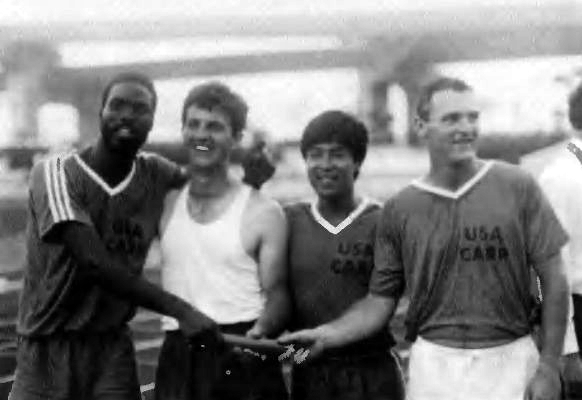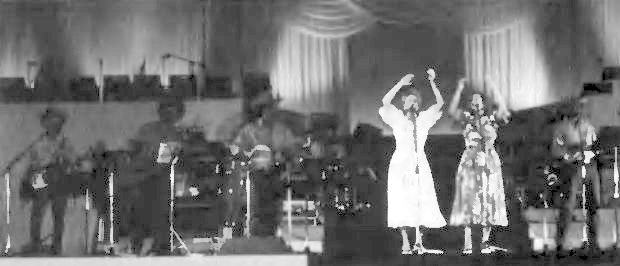![]()
The Words of the Lawson Family
|
|
The Words of the Lawson Family |

U.S.
relay team.
Upon returning here to the Big Apple," I found my eyes drinking in the fruits of American society, feeding a new hunger in my mind. A new fold of conscious appreciation and a more objective perspective had been opened through my experiences in Japan and Korea. I became more aware of multi-colored faces which greeted me as they flew past in so many different directions, pursuing their own versions of the American Dream. My initial impressions of Japan returned to me -- the homogeneity of the people and their lifestyle, the clearly defined roles of men and women, the tight, efficient organizations, and the contentment on the faces of those who have learned to live in groups in small places so well. To successfully marry these two worlds, I thought, would certainly be the miracle of the messianic age.
After experiencing the all-day rush hours of Tokyo, the tiny but abundant houses, restaurants, and cafes, the impossible number of Japanese that fit into the trains and the public-style baths, I asked myself: How do these people tolerate living so close together without much of an apparent need for personal space that is such a central part of Western living? The Japanese people as a whole, I discovered, have learned to "take dominion" over their physical environment in an efficient, sensitive, and well-orchestrated manner. Politeness, courtesy as well as honor, and corporate dignity seem to be the most visible values that keep this society running and developing rapidly.
As I observed the organization of the CARP Convention of World Students in Japan, I realized that CARP in Japan has embodied the best of Japanese social values with an added dimension of emotional sensitivity and international concern. Every aspect of the convention made deep and lasting impressions on my mind. I feel very much indebted to the Japanese CARP brothers and sisters for their warm and gracious care of all the participants. The polished, professional creation and organization of all the events brought a sense of dignity to their work of contributing to the future of young people and the world.
Through laughing, dancing, sharing, singing, and praying together with CARP members from 54 countries, I began to feel the living meaning of our one-world, one-heart dream. By the end of the convention, I could see that one culture's strengths could enrich another's weaknesses, especially within an atmosphere of mutual support and appreciation. My heart was particularly moved by the Filipino brothers and sisters. To be holding onto such an incredible dream -- in a social and economic reality that can only be described as miserable -- takes courage and an acute personal awareness of God's presence. I could not hold back the tears as they performed their national songs at the closing banquet. The same waves of emotion welled inside me as I watched the Thai members perform a native dance the same evening.
Observing the Korean members closely, I noticed the abundant flow of affection among the sisters as well as among the brothers. These strong friendships, I concluded, must prevent a great deal of selfish male-female relating. Their interaction was very beautiful to see. I had a strong desire to be a real part of them.

Musical
entertainment at the CARP Festival.
After ten days in Tokyo, we flew over to Seoul, Korea, for a brief stay. As we were descending upon the mountainous terrain of this peninsula, the spirit of "coming home" overwhelmed me. Our small group of American CARP members remained in Korea for only about forty hours. But for me, these hours were filled with moments that will remain as jewels in my memory, beckoning me to return for more. The character of the Korean people struck me as very earthy and aggressive. Their inner feelings were easy to read because their faces readily revealed all, unlike the more reserved Japanese. I admit that some of my own modern, high-tech, fast-paced Western flavor began to taste rather cosmetic and unnecessarily complicated as I noticed the Koreans' attitude toward living -- simple, basic, and very, very human. The natural environment and social atmosphere seemed extremely conductive to religious thinking, and I was intrigued by the many churches scattered everywhere.
Our drive up to Chung Pyung Lake was filled with scenes of the Korean countryside -- hard-working men and women who smiled at us through leathery faces, rice fields, little huts, and those endless sculpted peaks. As we greeted the blessed children gathered there, who were attending an international forty-day workshop, something like a magnetic force began to draw many emotions out of me. We joined them in a small room where they sat on the floor and listened to lectures in Korean. I looked over the blessed children's faces, and soaked in the brightness that came from their common awareness of the significance of this workshop.
While Dr. Seuk was speaking in Korean about the CARP convention, my gaze caught two big tears that made their way down Hyo Jin Nim's cheeks and fell into his lap. I tried to choke back my own tears, but they soon spilled out as well. I recalled the many discussions we had had in religion classes at school about the failures of new religious movements. The universal cause of failure in almost all the Christian renewal movements in America was the lack of participation by the second generation. I looked up at Hyo Jin Nim once again and wished there were some way to express my gratitude for his presence, concern, and leadership. I imagined that if Father and Mother were there they would feel so proud and hopeful at this scene.
When I first saw Hyo Jin Nim speak at the opening CARP banquet in Japan, I watched a young prince, unpolished in speaking manner -- an embodiment of what someone later described as "raw heart." Every time he spoke to us, I felt an immediate communion -- somehow his very presence could move so many emotions within all of us. In witnessing Hyo Jin Nim's heart, and sensing the commitment of the blessed children, a renewal of hope grew inside me. I felt anxious to prepare the campuses and the whole of American society to receive these ambassadors of love. The vibrations of a unified heart coming from Hyo Jin Nim and the blessed children were so attractive that I could easily imagine the crumbling of the false face of the present world.